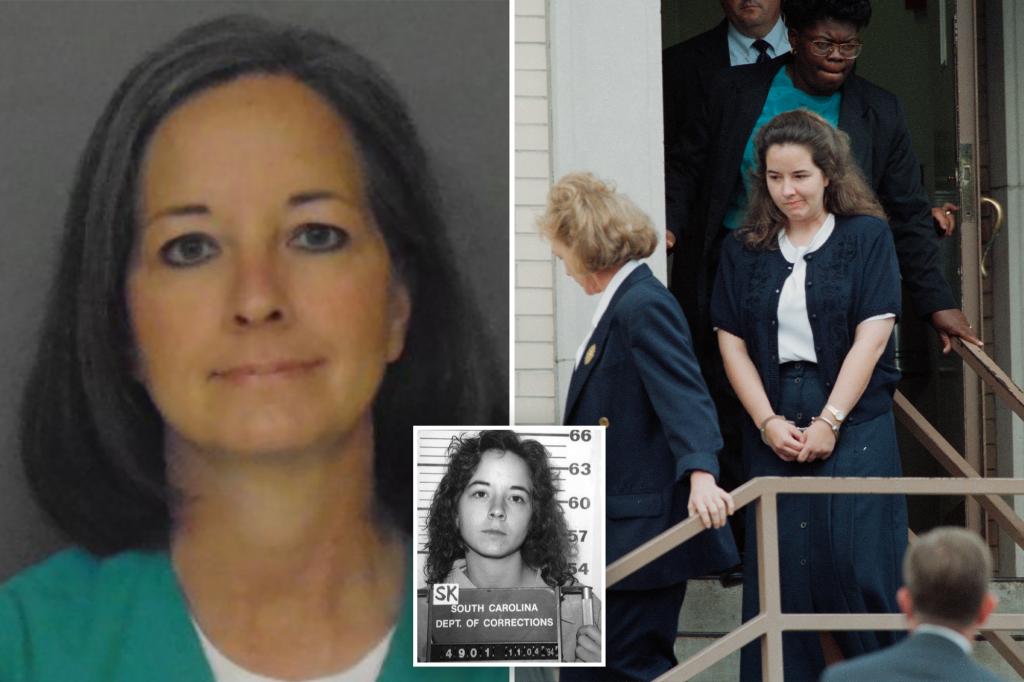Susan Smith, who was sentenced to life in prison in 1995 for murdering her two young children, has been convicted of a new disciplinary charge after speaking with a documentary filmmaker in violation of prison rules. The 53-year-old was charged with communicating with a victim and/or witness of a crime and was convicted in October. Despite being in prison, Smith agreed to provide the filmmaker with contact information for friends, family, and victims, including her former husband. This breach of prison policy led to Smith losing her telephone, tablet, and canteen privileges for 90 days.
The South Carolina Department of Corrections prohibits inmates from doing interviews on the telephone or in person, but they may write letters. Smith, who will become eligible for parole in November, discussed conducting an interview and even filming for a documentary with the filmmaker. The conversations between Smith and the filmmaker delved into details about her crime, including what was in the trunk of the car when it went into the water and her plans to jump from a bridge with her two sons, only for one of them to wake up. This was Smith’s first disciplinary action in almost 10 years.
Over the past three years, Smith has been in the spotlight for her courtship with nearly a dozen suitors over monitored jailhouse messages and telephone calls. Criminal defense attorney Philip Holloway believes that Smith’s chances of an early release are unlikely due to the horrific nature of her crime. It is uncertain how Smith’s latest disciplinary conviction will impact her upcoming parole hearing. The Department of Corrections will determine if and when Smith will earn the opportunity to be issued a tablet again for correctional use.
Despite Smith’s efforts to communicate with a documentary filmmaker, which led to her disciplinary charge, it is unclear how her actions will impact her eligibility for parole. The details of Smith’s crime, including her confession to drowning her two sons in a South Carolina lake, remain haunting. With Smith scheduled for her first parole hearing in November, the discussions she had with the filmmaker about conducting an interview and filming for a documentary raise questions about her intentions and motivations. The Department of Corrections will closely monitor Smith’s behavior and determine if and when she will be allowed access to a tablet for correctional use.
Susan Smith’s case has garnered attention over the years for her actions and interactions while in prison. Despite her previous attempts to communicate with others, including suitors over monitored messages and telephone calls, her chances of early release are considered unlikely by legal experts. The horrific nature of her crime and the impact it had on her two young children make it challenging for Smith to be granted parole. As she faces the possibility of being released back into society, the Department of Corrections will continue to evaluate her behavior and determine the appropriate course of action regarding her privileges and eligibility for further communication.
In conclusion, Susan Smith’s recent disciplinary charge for communicating with a documentary filmmaker has raised concerns about her intentions leading up to her first parole hearing in November. Despite the potential implications of her actions on her parole eligibility, Smith continues to be closely monitored by the Department of Corrections. With her history of breaching prison policies and her infamous crime, it remains to be seen how Smith’s parole hearing will unfold. The Department of Corrections will ultimately decide if and when Smith will be allowed to regain certain privileges while serving her life sentence for the murder of her two children.














